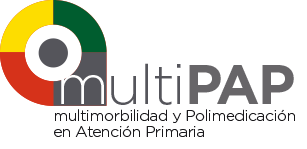Identification of the multimorbidity training needs of primary care professionals: Protocol of a survey
DOI: 10.1177/26335565211024791
Leiva-Fernández F, González-Hevilla A, Prados-Torres JD, Casas-Galán F, García-Domingo E, Ortiz-Suárez P, López-Rodríguez JA, Pico-Soler MV; MULTIPAP Group. Identification of the multimorbidity training needs of primary care professionals: Protocol of a survey. J Multimorb Comorb. 2021 Jun 21;11:26335565211024791. doi: 10.1177/26335565211024791. PMID: 34422674; PMCID: PMC8371279.
Abstract
Current epidemiological situation has prompted the consideration of multimorbility (MM) as a prevalent condition, influenced by age, educational level and social support, related to unfavorable social and health determinants. Primary Care (PC) has a key role in its approach but further training of professionals in MM is required. The evidence on the effectiveness of training interventions in MM is still limited. Knowing the experiences, opinions and training needs of professionals is essential to enhance training interventions.
Objectives: Identify perceived training needs by PC health professionals (doctors and nurses) in MM and polypharmacy.
Methods: Design: Cross-sectional study based on an online survey (anonymous-ad hoc questionnaire). Participants and recruitment: 384 doctors and nurses working in healthcare centers and out-of-hospital emergencies of the Spanish National Health System. Non-probabilistic convenience sampling via email addressed to Health Institutions, and social networks.
Data: Demographic characteristics and professional profile data (close-ended and multiple-choice questions) will be collected. Open-ended questions will be used to identify training needs, difficulties and resources about MM; required skills to care patients with MM will be assessed using a 4-item ordinal scale.
Analysis: Coding of data prior to analysis. Descriptive statistical analysis, participation and completion rates of the questionnaire and estimation of absolute and relative frequencies and 95% confidence intervals in close-ended questions. Content analysis with inductive methodology in open-ended questions. Ethics: Ethical approval, Online informed consent.
Conclusions: The identification of training needs of health professionals who care for patients with MM will be necessary data for developing highly effective training activities.
Keywords: Multimorbidity; learning; medical education; polypharmacy; primary health care.
© The Author(s) 2021.



